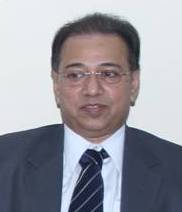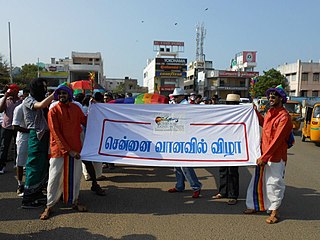The legal status of transgender people varies greatly around the world. Some countries have enacted laws protecting the rights of transgender individuals, but others have criminalized their gender identity or expression. In many cases, transgender individuals face discrimination in employment, housing, healthcare, and other areas of life.

In the Indian subcontinent, hijra are eunuchs, intersex people, or transgender people who live in communities that follow a kinship system known as guru-chela system. They are also known as aravani, aruvani, and jogappa. In Pakistan, they are known as khawaja sira, the equivalent of transgender in the Urdu language.

The Supreme Court of India is the supreme judicial authority and the highest court of the Republic of India. It is the final court of appeal for all civil and criminal cases in India. It also has the power of judicial review. The Supreme Court, which consists of the Chief Justice of India and a maximum of fellow 33 judges, has extensive powers in the form of original, appellate and advisory jurisdictions.

Lesbian, gay, bisexual, and transgender (LGBT) people in Kenya face significant challenges not experienced by non-LGBT residents. Sodomy is a felony per Section 162 of the Kenyan Penal Code, punishable by 21 years' imprisonment, and any sexual practices are a felony under section 165 of the same statute, punishable by 5 years' imprisonment. On 24 May 2019, the High Court of Kenya refused an order to declare sections 162 and 165 unconstitutional. The state does not recognise any relationships between persons of the same sex; same-sex marriage is banned under the Kenyan Constitution since 2010. There are no explicit protections against discrimination on the basis of sexual orientation and gender identity. Adoption is restricted to heterosexual couples only.

Lesbian, gay, bisexual and transgender (LGBT) people in India are afforded greater protections than those in many other Asian countries. However, Indian LGBT citizens may still face social and legal difficulties not experienced by non-LGBT people.

Lesbian, gay, bisexual, and transgender (LGBT) rights in Nepal have evolved significantly during the 21st century, though barriers to full equality still exist within the nation. In 2007, Nepal repealed the laws against gay sex and introduced several laws which explicitly protected "gender and sexual minorities". The Nepalese Constitution now recognizes LGBT rights as fundamental rights. On 28 June 2023, a single judge bench of Justice Til Prasad Shrestha issued a historic interim order directing the government to make necessary arrangements to "temporarily register" the marriages of "non-traditional couples and sexual minorities". The full bench of the Supreme Court has yet to deliver a final verdict. The first same-sex marriage of a trans woman and a cisgender gay man occurred in November 2023. Nepal is the first least developed country and the first in South Asia to legalize same-sex marriage, and the second in Asia after Taiwan.
India does not recognise same-sex marriage or civil unions, but Indians may enjoy several benefits as a homosexual live-in relationship.

The Yogyakarta Principles is a document about human rights in the areas of sexual orientation and gender identity that was published as the outcome of an international meeting of human rights groups in Yogyakarta, Indonesia, in November 2006. The principles were supplemented and expanded in 2017 to include new grounds of gender expression and sex characteristics and a number of new principles. However, the Principles have never been accepted by the United Nations (UN) and the attempt to make gender identity and sexual orientation new categories of non-discrimination has been repeatedly rejected by the General Assembly, the UN Human Rights Council and other UN bodies.
Discrimination against non-binary people, or people who do not identify exclusively as male or female, may occur in social, legal, or medical contexts.

K. S. Radhakrishna Panicker is a former judge of the Supreme Court of India. Prior to that, he served as the Chief Justice of Jammu and Kashmir High Court and Chief Justice of Gujarat High Court.

The Chennai Rainbow Pride March has been held by members of Tamil Nadu LGBTIQA+ communities every June since 2009. The pride march is organised under the banner Tamil Nadu Rainbow Coalition, which is a collective of LGBT individuals, supporters, and organizations working on human rights and healthcare for the LGBTQIA community. The Pride March occurs on the final Sunday of June every year. The Pride March is usually preceded by a month-long series of events organized by NGOs and organizations to inculcate awareness and support for the LGBTQ community, such as panel discussions, film screenings, and cultural performances. The Chennai Vaanavil Suyamariyadhai Perani a.k.a. Chennai Rainbow Self-Respect March is known for being inter-sectional in nature as it addresses issues with multiple axes such as caste, class, religion coupled with gender discrimination.

Lesbian, gay, bisexual and transgender (LGBT) people in Kerala face legal and social difficulties not experienced by non-LGBT persons. However, Kerala has been at the forefront of LGBT issues in India after Tamil Nadu. It became one of the first states in India to establish a welfare policy for the transgender community and in 2016, proposed implementing free gender affirmation surgery through government hospitals. Same-sex sexual activity has been legal since 2018, following the Supreme Court ruling in Navtej Singh Johar v. Union of India. In addition, numerous LGBT-related events have been held across Kerala, including in Kochi and Thiruvananthapuram. However, there is also increasing opposition to LGBT rights recently as evidenced by the anti-LGBT campaigns spearheaded by meninist groups and Muslim organisations like Indian Union Muslim League, Samastha and Jamaat-e-Islami.

Multiple countries legally recognize non-binary or third gender classifications. These classifications are typically based on a person's gender identity. In some countries, such classifications may only be available to intersex people, born with sex characteristics that "do not fit the typical definitions for male or female bodies."
The Transgender Persons Act, 2019 is an act of the Parliament of India with the objective to provide for protection of rights of transgender people, their welfare, and other related matters. The act was introduced in the Lok Sabha, the lower house of the Parliament, on 19 July 2019 by the Minister of Social Justice and Empowerment, Thawar Chand Gehlot, in light of the lapse of the Transgender Persons Bill, 2018. The 2019 act and the immediately preceding 2018 bill, were both preceded by a 2016 version. They were met with protests and criticism by some transgender people, lawyers, and activists in India. The 2016 bill was sent to a standing committee which submitted its report in July 2017. Following this, the Lok Sabha tabled and passed a newer version of the bill in December 2018. However, it did not incorporate many of the committee's recommendations. Although members of the opposition criticised the 2019 act and assured activists that they would not vote in favour of it, it was passed by the Lok Sabha on 5 August 2019 and by the Rajya Sabha, the upper house of the Parliament, on 26 November 2019. The president assented to it on 5 December 2019, upon which the act was published in the Gazette of India. It has been in effect since 10 January 2020 following a notification of the same in the Gazette on the same day.

Gender self-identification is the concept that a person's legal sex or gender should be determined by their gender identity without any medical requirements, such as via statutory declaration.

S Sushma &Anr. versus Commissioner of Police&Ors.(2021) is a landmark decision of the Madras High Court that prohibited practice of "conversion therapy" by medical professionals in India. The court directed comprehensive measures to sensitize the society and various branches of the Union and State governments to remove prejudices against the queer community.

Chinmayee Jena versus State of Odisha &Ors.(2020) is case where the Orissa High Court upheld the right of self-determination of gender as an integral part of personal autonomy and self-expression. The court recognized the rights of trans persons to cohabit with the partner of their choice, regardless of the “gender” of the partner.

Arun Kumar &Anr. versus Inspector General of Registration&Ors. (2019) is a decision of the Madras High Court which recognised trans woman as a "bride" within the meaning of the Hindu Marriage Act 1955 and prohibited genital-normalizing surgery for intersex infants and children except on life-threatening situations.

Supriyo a.k.a Supriya Chakraborty & Abhay Dang v. Union of India thr. Its Secretary, Ministry of Law and Justice & other connected cases (2023) are a collection of landmark cases of the Supreme Court of India, which were filed to consider whether to extend right to marry and establish a family to sexual and gender minority individuals in India. A five-judge Constitution Bench, consisting of Chief Justice of India D.Y. Chandrachud, Justice S.K. Kaul, Justice S.R Bhat, Justice Hima Kohli and Justice P.S. Narasimha, heard 20 connected cases brought by 52 petitioners.

Chanchal Bhattacharya versus State of West Bengal &Ors. (2015), a decision of the Calcutta High Court, asserts that individuals who have undergone gender-affirming surgery have a constitutional right to the recognition of their affirmed gender. The verdict emphasized the importance for educational and administrative institutions to adjust their records to reflect such changes, aiming to prevent inconvenience or discrimination.













